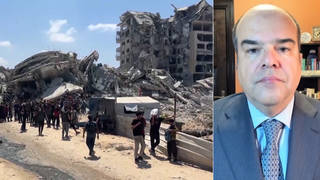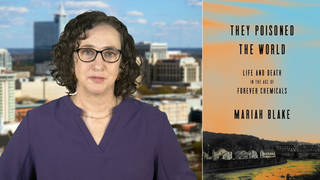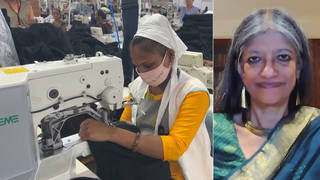
Guests
- Grace Lee Boggs92-year-old activist who has been pivotally involved with the civil rights, Black Power, labor, environmental justice and feminist movements. She has lived in Detroit for 54 years was active in the Black Power movement in the years leading up to the rebellion of 1967. In 1992 she co-founded the Detroit Summer youth program to rebuild and renew the city. Grace Lee Boggs currently works with the Beloved Communities Initiative and writes for the weekly Michigan Citizen. Her autobiography, Living for Change, was published in 1998.
Joining the discussion from Detroit is Grace Lee Boggs, a philosopher and an activist who has lived in Detroit for 54 years. She was a central figure in the civil rights and Black Liberation movements. She just turned 92 and continues to be at the forefront of struggles to rebuild communities in Detroit and rethink radical politics. [includes rush transcript]
Transcript
AMY GOODMAN: Joining us from Detroit is Grace Lee Boggs, philosopher and activist who’s lived in Detroit for 54 years. She was a central figure in the civil rights and Black Liberation movements. She just turned 92 and continues to be at the forefront of struggles to rebuild communities in Detroit and rethink radical politics. Welcome to Democracy Now!, Grace Lee Boggs.
GRACE LEE BOGGS: Thank you.
AMY GOODMAN: Tell us about Detroit 40 years ago. As Newark, the rebellion, quieted down, why did Detroit erupt?
GRACE LEE BOGGS: Well, Jimmy and I, my husband, my late husband Jimmy and I, were in California, actually, when Detroit exploded in July. But prior to our leaving for vacation, Jimmy had talked to the people who were with us in the Inner City Organizing Committee, that something was bound to happen and that we should try and stay away from it, because there was a climate in Detroit, which meant that things had to explode.
Two things were happening. One, young people were being frisked and stopped and frisked by the police, whom they considered an occupation army. At the same time, beginning in the early ’60s, a number of us had been saying that as the population of Detroit was becoming majority black, it was wrong for the city to be run almost exclusively by whites. The city council was almost — there was one black person on it. The school board was white. The school superintendent was white. And that was not in the tradition of cities being run by the ethnic group, which is becoming the majority, so this idea that there was a certain justice about Black Power and also a sense of outrage by young people at the treatment that they were given by the police.
Another thing that was also happening in Detroit was that automation had come to the plants, and young people were feeling that they were being made expendable and that there was no longer any future for them. And so, the rebellion was also a cry for help, for understanding by these young people that something very fundamental was happening that required change.
And I think to understand the depth of the roots of what happened helps us to get beyond seeing it as a riot and helps us to see that there were issues raised there that we still face. In other words, Genarlow Wilson would not be criminalized for oral consensual sex with a young woman if it were not for the fact that our society does not know what to do with these young people, what perspective, what vision to offer them, and all we do is criminalize them. So we have this exploding prison population. We have the equivalent of martial law on a day-to-day, 24/7-hour basis in our cities, because we have not heard the cry for help by young people in 1967.
JUAN GONZALEZ: Grace Boggs, I want to ask you, in terms — you mentioned the plants, and, of course, a very big difference between Detroit and Newark was the enormous importance of the automobile industry to that city, the heart-blood in those days of American capitalism, and many, many black workers who had moved, especially during World War II, into the plants, and there was a resurgence of a whole new radical labor movement subsequent to that — the League of Revolutionary Black Workers and other groups that developed. Could you talk about the impact of the rebellion on sort of the political consciousness of the black community?
GRACE LEE BOGGS: Well, what was happening — you see, during World War II, for the first time as a result of the March on Washington in 1941, black workers were being — had gotten jobs in the plant and had acquired enough seniority and wages to buy a home and send their kids to college, kids who became actually the SNCC activists in the civil rights movement. But this was drying up for young people, and what was in front of us was a shrinking working class, rather than an expanding working class. And this required a whole new concept of education. It required a whole new concept of justice. It required a whole new concept of what is the purpose of work.
Detroit had been the national, international symbol of industrialization and successful industrialization for the first half of the 20th century. Now, it was becoming de-industrialized, and we had not yet thought through creating the kinds of infrastructure that are needed for a de-industrializing society. For cities in the 21st century, we have to become very different from what was possible, both ecologically possible and in every other respect during a period of expanding industry. And I think it’s within that historical perspective that we have to understand '67, not only in terms of white power versus black power or black power versus white power, but in terms of the transition that the world and the United States and Detroit, in particular, is undergoing. I think it's within that context that we can get beyond the criminalization, the sort of martial law-ization of our society at the present time.
AMY GOODMAN: Grace Lee Boggs, in Newark 26 people were killed in the rebellion, 24 of them African-American, then a fire captain and a policeman. In Detroit, 43 people were killed. How did that happen? Were there indictments? There were none in Newark.
GRACE LEE BOGGS: There were not indictments. And the question of — I mean, the question — I think what I hear, Amy, is that we think that the question of justice is a question of whether we indict or whether we prosecute. And I think that we’re reaching another stage, where we have to see the question of justice in terms of how do we rebuild our communities, how do we restore our people, how do we as Americans with this terrible crisis that we’re in now, not only in our cities but across the world, how do we become human beings, how do we take another leap in our evolution as human beings.
AMY GOODMAN: You are a Chinese-American woman. Your father ran a Chinese restaurant not far from here in Times Square in New York. And you graduated in 1935, got your Ph.D. in 1940 from Bryn Mawr. How did you end up getting involved with black radical politics?
GRACE LEE BOGGS: Well, the story — I think folks have to understand that, first of all, in 1940, when I got my Ph.D., Chinese Americans couldn’t even get jobs in department stores. They would come right out and say — Macy’s would come right out and say, “We don’t hire Orientals.” And it was under those circumstances, when the question of race was so primary in this country, that I was looking for a job. Not thinking — thinking it was ridiculous to think I might get one at a university, I began to find a way to make links with the black movement, especially through the March on Washington movement, which was led by A. Philip Randolph in 1941. I decided I wanted to make movement politics my life at that time. And it’s been my life for the last 65 years.
AMY GOODMAN: 1941. I don’t think people know about a march on Washington or certainly don’t know who A. Philip Randolph is.
GRACE LEE BOGGS: I know. And really, I’m not — I think maybe it’s important to know, because up to 1941 and the March on Washington movement, which was led by A. Philip Randolph, who was a founder of the Brotherhood of Sleeping Car Porters, blacks were not able to get the kinds of jobs that would provide them with any security, with any seniority. The defense plants — I mean, the Depression in 1940 had ended for white workers, because the war production was booming, but not for black workers. And it was under those circumstances that the movement of blacks to get jobs, which took the form of a challenge — of the projection of a march on Washington, which scared Franklin D. Roosevelt to death. I’m not quite — I mean, he was forced to issue Executive Order 8002, that we began to have a black working class. And then, very soon, because the technology of World War II was introduced to the plant, that future began to close down for black young people.
And I think it’s necessary to understand that the first rebellion took place in Watts in 1965, in July 1965 — in August, actually, 1965, shortly after the signing of the Voting Rights bill, which came out of Selma. And a few days after that, the Watts erupted, and Martin Luther King went to Watts, found that the kids had no idea what he had been doing, and they were very proud that they had erupted and forced people to recognize that they existed. And in response to that, King moved to Chicago in 1966 to listen to these young people, and he came to the conclusion at the end of his life that what we needed was to listen to them and understand that the age of just expanding economically and technologically had come to an end, or we needed to bring it to an end and understand how it had created and had destroyed community and denied participation to so many people. And so, we were at a watershed in human history, and that’s where we are today. And I think that’s the context in which we have to look at what happened in ’67.
JUAN GONZALEZ: I’d like to ask you, in relationship to when you say that the young people were proud of the fact they had forced a recognition of themselves, the role of the media, of the news media, in terms of — the Kerner Commission, obviously, after Detroit and Newark, said that the — blamed the media for, one, failing to at all deal with racism in American society, but also found instances where reporters actually fabricated violent events during the rebellions to make things look even worse than what they were. Your analysis of the media’s impact on public consciousness?
GRACE LEE BOGGS: But they were pretty bad. I think if — not to acknowledge that they were pretty bad. I’m just thinking, for example, Mack Avenue, up the street from where I live, before the rebellion, we had a whole lot of small stores, drugstores, hardware stores, small restaurants. Now, it’s a complete wasteland. And many sections of the city were looted and burned. I mean, it was a very difficult and painful period. But out of the pain, what we got out of the pain was a kind of black political power within the cities. But the blacks who came to power in the cities had the same sort of institutions to administer. So it wasn’t a question of changing from white to black, but changing the whole infrastructure, because the rebellions represented this cry from young people to be of use in some way, to have a society in which, instead of being outsiders, they were part and parcel of belonging and creating and being of use.
JUAN GONZALEZ: Amiri, what has changed in these 40 years, in terms of consciousness and in terms of what the country has learned from that period?
AMIRI BARAKA: Well, actually, in some ways, we’ve gone full cycle but up to another level. I mean, we went from the kind of blatant brutalization, of white supremacy and racism. We then organized ourselves and elected two black mayors. We haven’t —- none of my children, for instance, have ever grown under white people ruling in Newark. They don’t even know what that is, you understand? And so, we can be proud of that. But at the same time, after we had our two domestic kind of mayors, who compromised relentlessly with corporate power, you understand, now we’ve come full circle and come to -—
GRACE LEE BOGGS: Let me ask you a question, Amiri. Do you think that we have challenged and criticized and evaluated Black Power sufficiently?
AMIRI BARAKA: Have we? No, no, but I’ve been doing it for — I’m sorry.
GRACE LEE BOGGS: When are we going to do it?
AMIRI BARAKA: Well, I’ve been doing it for almost 37 years. I mean, having two black mayors there, Sharpe James and Ken Gibson, I was probably their most relentless critic all the time. But now we have somebody who doesn’t compromise with corporate power, but who represents it. So that’s the difference. We’ve moved —
GRACE LEE BOGGS: Well, so do you think it’s a question of changing an individual? You know, for changing from Gibson to Booker?
AMIRI BARAKA: No, you have to get an individual who’s willing to change the system. You have to get an individual who’s willing to actually struggle with the system to change it. As long as you have people who —
GRACE LEE BOGGS: I mean, what do we mean by “struggling with the system”? How —- when are we going to be -—
AMIRI BARAKA: To make substantive changes, to make infrastructure changes.
GRACE LEE BOGGS: No, when will we begin to understand that we have to create new infrastructures, new forms, so that you can —
AMIRI BARAKA: Yeah, but you can only do that through people, you see?
GRACE LEE BOGGS: But you’re not going to do it from people at the top. We’re going to do it from people at the bottom.
AMIRI BARAKA: Well, you have to mobilize the whole community. But what I’m saying is that people at the top became accommodated to being in power and not changing.
GRACE LEE BOGGS: Yes, but maybe what we’ve done — maybe what we’ve —- yes, but you see, we’ve put so much emphasis on taking over the power structure, and we became prisoners of it, because the power structure -—
AMY GOODMAN: I’m going to have to leave it there, but we’re going to continue the discussion after the show, and then we’ll broadcast that. I want to thank you so much for being with us, Grace Lee Boggs, Amiri Baraka and Larry Hamm.













Media Options